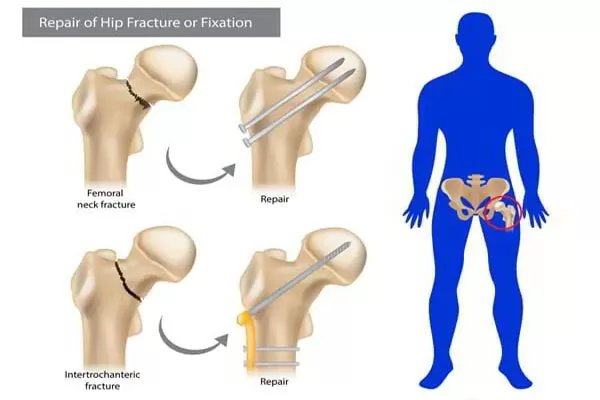
What is a Hip Fracture?
Various types of accidents and their causes injury to your upper part of the thighbone (femur) leading to a hip fracture. Hip fractures can also be common among the elders due to natural and inevitable weakening of bone structures and due to overall decline in the general health. Almost all hip fractures cause severe pain and may require surgery instantly except in a few rare cases.
What are the risk factors for Hip Fracture?
Fractures of the hip are becoming more common and cause of a hip fracture include:
Lifestyle: It is very crucial to have healthy and active lifestyle. Unhealthy drinking levels of alcohol may weaken bones and may increase your fracture risk.
Medications: Some medicines can cause side effects such as lethargy or a drop in blood pressure, which can cause you to lose your balance leading to untoward accidents.
Age: Many seniors and some people having movement and balance related issues, may fall and fracture. In most of the cases, aging over 65 can weaken bones and make them porous and brittle (osteoporosis).
Gender: Comparing to Older men, aged women are vulnerable to get hip fractures as all women gradually tend to lose bone mass after menopause. Bone – breakdown, accidents, fractures, or injury may be more expected among aging women folks. Genetically, women are more likely to have osteoporosis than men by four times.
Overall health: Some people may have vitamin D, calcium, and other nutrients deficiencies and such individuals may have a fracture risk. Also, health conditions such as dementia and Parkinson’s disease, increase the risk of a fall. Conditions such as Rheumatoid arthritis, Osteoarthritis, Osteonecrosis, and tumor in the hip can also often weaken the hip joint.
What are the symptoms of a Hip Fracture?
Although the onset of hip fracture symptoms typically come on suddenly, they can also start gradually and worsen with time. Signs of a hip fracture include:
- Hip pain is severe and sharp.
- Mild or achy hip pain.
- Pain in the thigh, outer hip, pelvis, and groin area.
- Pain may radiate down your buttock to your leg (sciatica).
- Limited mobility
- You may have a bruise on your hip.
- One of your legs may appear shorter than the other.
- The hip might look like it is out of position, twisted, or rotated.
Tests and Diagnosis before Hip Fracture Surgery
To diagnose a fracture and check for damage to soft tissues, you may have to undergo certain imaging studies. These may include:
X-ray: To produce images of your bones.
MRI: To create pictures of bones and soft tissues.
CT scan: To see detailed images of the damaged area.
Surgical Procedure
Your surgeon will decide the type of surgery generally depending on location and severity of the fracture. Your surgeon will assess the broken bones when they are displaced. Your age and underlying health conditions also play a vital role in deciding the type of the surgery.
The choices include:
- Total hip replacement: Both the upper femur and the socket in the pelvic bone are replaced with prostheses. In minimally invasive surgical procedures, the artificial implants are the same as traditional hip replacements, however, the difference is minor incisions and minimal soft tissue dissection. This has an added benefit of quick healing, less scarring, less pain, among many other benefits.
- Partial hip replacement: In a few situations, the socket part of the hip is secured and needs partial replacement in the femur, such a surgical procedure is called partial hip replacement. Sometimes, the hip joint may be needing a half replacement known as hemiarthroplasty.
- Internal repair using screws: Metal screws are inserted into the bone to hold it together while the fracture heals. Sometimes screws are attached to a metal plate that runs down the thighbone.
- The surgeries are performed under general anesthesia. Your surgeon may recommend a full or partial hip replacement depending on the damage caused that affects the blood supply to the ball part of the hip joint during the fracture.
Post-operative precautions after Hip Fracture Surgery
After the surgery, you must take care to ensure proper healing and prevent another dislocation. Physical rehabilitation is a critical component of recovery. Your surgeon will recommend specific exercises or direct you to a therapist to help increase your range of motion and restore your strength. Some of the crucial precautions for 6 weeks are listed below.
- Use an elevated toilet seat
- Never cross your legs
- Never bend your hips past a right angle (90°)
- Avoid sitting on low chairs
- Keep a pillow between your legs while sleeping.
- Avoid bending down to pick up things
- Avoid combined movement of bending your hip and turning your foot inwards
What are the risks and complications?
Like every other surgery, complications can arise depending on your health condition and recovery. A few of these complications are listed below.
- Dislocations
- Infections
- Blood clots
- Nerve and artery injuries
- Delayed wound healing
- Fracture of the femur
- Differences in leg length
What are the advantages of Hip Fracture surgery?
This may improve your mobility and overall quality of life. Contrarily delaying surgery after a hip fracture is associated with worse outcomes.
When should you Call your Doctor?
If you notice bleeding, signs of infection, or severe pain that doesn't go away with pain relief medications, call your healthcare provider for further evaluation.
